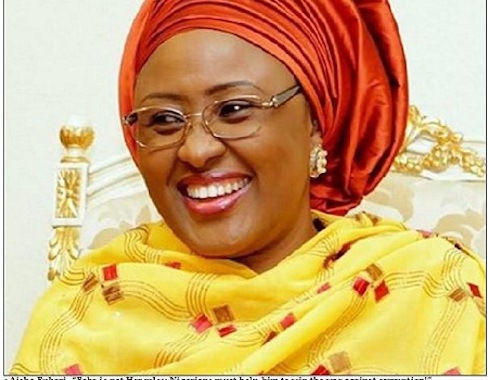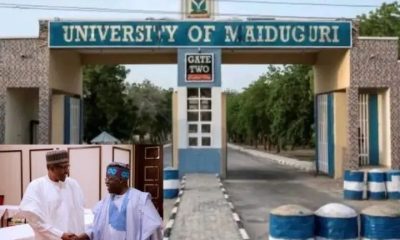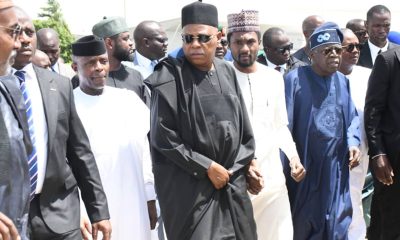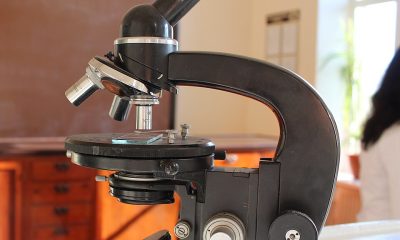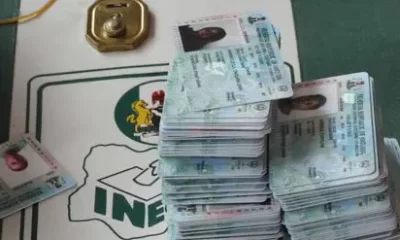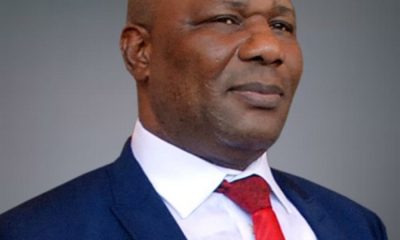Foreign News
Buhari Approves 50 Volunteers For Liberia

By Mathew Dadiya, Abuja
President Muhammadu Buhari on Friday in Monrovia, Liberia said that Nigeria will this year provide 50 volunteers in the field of education and health to support Liberia addresse its challenges in those field.
This, the President said would be done through the nation’s Technical Assistance Programme.
President Buhari also assured that the continent’s largest nation was also prepared to deploy additional volunteers in the other fields, in order to contribute to the capacity building in Liberia.
Buhari who conveyed the felicitations of Nigerians to their brothers in Liberia, said “Today represents yet another significant milestone in the life of the brotherly nation of Liberia.
“Nigerians rejoice with all Liberians on this momentous occasion. It is a matter of pride that Liberia, the first country in Africa to gain its Independence, has successfully preserved its unity and cohesion, despite the tragic events that culminated in an unfortunate civil war.
“I am here to celebrate with you this remarkable achievement while at the same time recalling the enormous contributions and sacrifices made by Nigeria in your recent history.”
The Nigerian leader further assured Liberians of continued support of the country to its development: “As Liberia sustains its notable efforts towards economic recovery, I wish to assure you of Nigeria’s commitment to continue to partner with the country, for all possible assistance with a view to making our modest contributions that will positively impact on the security and economic well-being of the Liberian people.
Speaking on Nigerian experience, the president explained that having realised the futility in continuing to subject the Nigerian economy to the vagaries of its mono-product dependence, his administration has instituted policies aimed at diversifying the national economy which were yielding positive results.
He added that the Economic and Recovery Growth Plan launched by his administration in 2017 was creating the enabling environment for growth, security and economic revival.
“Our government had to adopt appropriate measures including diversification and reforms to address such underlying causes exemplified by our continued dependence on a single-commodity, crude oil, lack of fiscal buffers, leakages, corruption and high governance costs.
“Furthermore, in our efforts to stimulate the economy, our government initiated bold policy interventions that are beginning to yield positive results,”he stated.
Buhari, who was honoured at Liberia’s 172nd Independence Anniversary occasion with the country’s highest award, the “Most Venerable Order of the Knighthood of the Pioneers of the Republic of Liberia with Grade of the Knight Grand Cordon”, said he accepted it ” on behalf of all Nigerians and as a tribute to all our country men who paid the supreme price in aid of Liberia’s unity and stability.”
He also thanked the Government and people of Liberia and expressed his resolve to continue to strengthen cooperation within the sub region.
Buhari added that, “This gesture can only strengthen my resolve to rededicate myself to the service of my country, work for the prosperity of our people in the sub-region.”
The President likened the Liberian economic situation to what obtained in Nigeria when he assumed office in 2015 and praised the administration of President George Weah for its social intervention programme.
He told President George Weah that, “I am fully aware that on assumption of office, your country was experiencing severe economic challenges occasioned by the fall in commodity prices, the main source of revenue for Liberia. This situation is akin to what I inherited on my election in 2015. That was a difficult period for the Nigerian economy which later lapsed into recession.”
He commended Weah’s leadership and vision for initiating since coming to office, people oriented projects and programmes including the “Pro-Poor Agenda for Prosperity and Development” (PAPD) launched in 2018.
“I am convinced that this well-articulated programme which is quite similar to our Government’s Economic Recovery and Growth Plan 2017-2020, if well implemented, could bring the desired transformation and sustainable development to Liberia.”
The President encouraged his Liberian counterpart to take decisive actions to further stimulate the economy of the country: “Mr. President, Liberia under your leadership may wish to learn from our experience by taking courageous steps to diversify its economic base by developing the productive sector that would complement earnings from rubber, iron ore and the increasingly dwindling funds from Development Partners.
“In this regard, the need for proper management of human resources and investment in agriculture, solid minerals and other sectors such as tourism where the country has comparative advantage, cannot be overstated.”
Meanwhile, the Ambassador of Nigeria to Liberia, Mer. James Dimka told newsmen that the what was deserving because, “We have done what no other African President has done to the country. We have had close relations (Nigeria and Liberia) and this has only strengthen our relations. Liberia was in war for 14 years and the major country that stood by them was Nigeria. Our military just left this country about a month ago. At some point the United Nations, ECOWAS were but Nigeria stayed till the end.
“And so you will recognize that there is a strong relations between Nigeria and Liberia.”
Governor Kayode Fayemi of Ekiti said, Nigeria has sacrificed so much for the country even though Liberia is older going by flag independence record.
He said: “Nigeria has done a lot to keep Liberia one. This is the first country we sent the first ECOMOG to and several Nigerians lost their lives to. Uptil very recently, a Nigerian, Gen. Abdulrahman was Chief of Defence Staff here and he lost his life in the course of serving this country. Before him other Nigerians headed their military, Gen Obiakor was the head of mission. I spent sometime here on the flip side of the conflict as the mediator and negotiator in the difficult days here. President Obasanjo was critical in the management of the conflict and President Buhari followed on in that capacity and he is still doing a lot for peace in West Africa as Chairman of ECOWAS.
“So, it is a fitting and proper honour done to him and by extension to all of us in Nigeria. Because, somethings Nigerians wonder why we do so much in the subregion and Africa without getting much in return. Return comes in various forms and recognizing with the highest honour in the land shows how grateful the Liberians are in the role Nigeria continues to play in the country.
Governor Mai Mala Buni of Yobe said, the honour is for President Buhari and Nigeria considering the role he is playing in the west Africa subregion and the continent.
He said the award shows how much respect the President commands from his counterparts in the region.
The Senior Special Assistant on Media and Publicity, Garba Shehu said award is in recognition of all the country has done to help Liberia.
“This country with the longest history of independence but couldn’t hold together and was helped majorly by Nigeria, with everything we had, our armed forces, resources in other to help them to remain as one united people.
“It is also in recognition of Nigeria’s support for Liberia to rebuild. He has offered 50 technical aid corp to Nigeria and has promised many more in case there is need.”
Foreign News
Australian Researchers Launch Open-source, Affordable DNA Measurement Device

Australian researchers have created an affordable, open-source device to measure DNA levels using parts made with a standard 3D printer.
The Do-It-Yourself Nucleic Acid Fluorometer (DIYNAFLUOR) offers an affordable alternative to expensive commercial DNA fluorometers, often out of reach for many researchers.
This is according to a statement released on Wednesday by Australia’s University of Queensland (UQ), which led the research.
Fluorometers, vital for DNA sequencing, which itself is essential for disease detection, therapeutic innovation, and species identification, can now be easily built at home.
Thanks to the simple, accessible device developed by UQ’s Australian Institute for Bioengineering and Nanotechnology (AIBN), the statement said.
The device can be built in under a day for around 60 Australian dollars (about 39 dollars) using off-the-shelf electronics and 3D-printed parts.
It’s with free instructions online and no need for advanced skills or specialised tools, said the designer of the device, Will Anderson, at the AIBN.
Once built, the device quantifies DNA by using a light beam to produce a fluorescent response from the dyed DNA present in the sample.
It would then report the DNA concentration to a connected computer, Anderson said.
“This is crucial information that can tell you whether you can proceed with more expensive tests and sequencing,” he added.
Laboratory tests confirmed the device matches the accuracy and sensitivity of costly commercial models, offering an affordable, open-source solution for researchers in resource-limited, remote, or educational settings, said the study.
Foreign News
Trump Imposes 25% Tariff on Indian Goods, Criticizes Ties with Russia

U.S. President Donald Trump said he is imposing a 25 per cent tariff on goods from India starting on Friday.
Writing on his Truth Social platform, Trump sharply criticises New Delhi for its military and energy ties with Russia.
He described India as a “friend” but accused the country of maintaining unfair trade practices that disadvantage U.
S. businesses.India has “strenuous and obnoxious” trade barriers that keep its markets closed to companies, he wrote, adding that its tariffs are “far too high.
”Trump also took aim at India’s relationship with Russia, saying: “They have always bought a vast majority of their military equipment from Russia, and are Russia’s largest buyer of ENERGY, along with China.
In addition to the new tariff, Trump said India would face a financial “penalty” for its purchases from Russia, though he did not provide further details.
Foreign News
Zelensky Announces New Draft Law on Anti-corruption Bodies after Protests

Ukrainian President Volodymyr Zelensky said he has approved the text of a draft law guaranteeing the freedom of two anti-corruption bodies in Ukraine – days after nationwide protests broke out over changes curbing their independence.
Kyiv’s Western partners had also expressed serious concerns over the legislation.
On Thursday, Zelensky seemed to backtrack, saying the new bill was intended to safeguard the independence of Ukraine’s National Anti-Corruption Bureau (Nabu) and Specialised Anti-Corruption Prosecutor’s Office (Sap), and to protect them from Russian influence.
He said the text of the bill was “balanced”, but did not provide any details.
The law passed earlier this week brought Nabu and Sap under the control of the prosecutor general, who is appointed by the president.
At the time Zelensky justified his decision to curtail the bodies’ powers by citing Russian influence. The day before, Ukraine’s security services had carried out searches and arrests targeting alleged Russian spies at the agency.
The passing of the legislation instantly sparked the largest protests since the start of Russia’s full-scale invasion in February 2022 in several cities across Ukraine, with many worrying the law would severely undermine the Nabu and Sap’s authority and effectiveness.
Thousands of people gathered in streets and squares across Ukraine, holding placards calling for the legislation to be vetoed.
Several commentators accused Zelensky of democratic backsliding. Their concerns were further exacerbated when Ukraine’s Western partners signalled their displeasure with the bill.
Ukraine has official EU candidate status and a spokesman for European Commission chief Ursula von der Leyen previously warned Kyiv that the rule of law and the fight against corruption were “core elements” of membership to the bloc.
On Thursday, the Commission said it “welcomed” the Ukrainian government’s decision to take action against the bill.
“We are working [with the Ukrainian government] to make sure that our concerns… are indeed taken into account,” the spokesman said.
Nabu and Sap were created in 2014-15 as one of the requirements set by the European Commission and International Monetary Fund to move towards a relaxation of visa restrictions between Ukraine and the EU.
Writing on Facebook, opposition MP Oleksiy Goncharenko noted Zelensky said that “the independence of anti-corruption institutions must be guaranteed.”
“First we take it away, and then we say that it must be guaranteed. So why was all this necessary?”
In his message on social media on Thursday, Zelensky did not acknowledge the protests or the backlash but said it was “important that we respect the position of all Ukrainians and are grateful to everyone who stands with Ukraine.”


